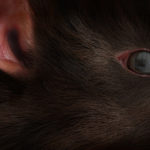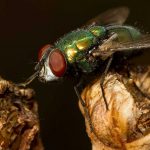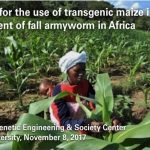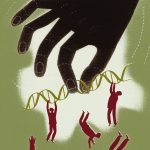
WIRED: Process of Elimination
A deep dive into the inception of the Genetic Biocontrol of Invasive Rodents (GBIRd) program, this article in WIRED details how Karl Campbell of Island Conservation came across GES Co-Director Fred Gould's research suggesting that the genetic engineering techniques being used to manage insect populations could also be applied to other species, like rodents. And then, what happened when CRISPR came along....
Journal of Responsible Innovation publishes ‘Roadmap to Gene Drives’ special issue
The Genetic Engineering and Society Center at NC State hosted a workshop in February of 2016, supported in part by the National Science Foundation, entitled ‘A Roadmap to Gene Drives: A Deliberative Workshop to Develop...
Barrangou Wins NAS Prize in Food and Agriculture Sciences
Dr. Rodolphe Barrangou adds another award to his long list of accolades: the 2018 NAS Prize in Food and Agriculture Sciences for his discovery of the genetic mechanisms and proteins driving CRISPR-Cas systems....Continue reading "Barrangou Wins NAS Prize in Food and Agriculture Sciences"

Barrangou Wins NAS Prize in Food and Agriculture Sciences
Dr. Rodolphe Barrangou adds another award to his long list of accolades: the 2018 NAS Prize in Food and Agriculture Sciences for his discovery of the genetic mechanisms and proteins driving CRISPR-Cas systems....Continue reading "Barrangou Wins NAS Prize in Food and Agriculture Sciences"

Gould quoted in Nature on synthetic organisms unable to breed with wild counterparts
Fred Gould is quoted in Nature, discussing a gene editing technique designed to make interbreeding between synthetic and wild organisms impossible. The technology, which targets gene expression, could be applied to mosquitoes to control infectious diseases, such as malaria, or to invasive species, like Asian carp. "This is an ingenious system."...
Scott Lab Research Featured During Visit from Central American Officials
Written by Melinia Florez-Cuadros At NC State, Dr. Max Scott and his lab are engineering transgenic strains of sheep blowfly, which is a pest species in Australia but also serves as model system for the New...Continue reading "Scott Lab Research Featured During Visit from Central American Officials"

Jennifer Kuzma on Institute for Emerging Issues First in Future podcast
December 12, 2017 Dr. Jennifer Kuzma speaks with Leslie Boney, Director of the Institute for Emerging Issues (IEI) at NC State on the First in Future podcast. In this pod, Dr. Kuzma discusses gene edited...Continue reading "Jennifer Kuzma on Institute for Emerging Issues First in Future podcast"

Gene Drives and Responsible Innovation
It is not often that a new technology is at once hailed as a potential solution to pandemic disease, wildlife conservation and hunger, while also being feared as a potential military and environmental “bioweapon.” Gene drives,...
Funders respond to NASEM Gene Drive study
Funders of the National Academy of Sciences consensus study Gene Drives on the Horizon (2016) have published a response to the report in the December 2017 issue of Science. The study summarized "current understanding of the scientific discoveries related to gene drives and their accompanying ethical, legal, and social implications," and was co-authored by Dr. Jason Delborne, associate professor of science, policy and society in the College of Natural Resources and executive committee member of the GES Center....Continue reading "Funders respond to NASEM Gene Drive study"

Jason Delborne appointed to National Academies Forest Biotech Study Committee
Dr. Jason Delborne has been appointed to the National Academies of Sciences provisional committee on The Potential for Biotechnology to Address Forest Health, or Forest Biotech Study. The study will be looking at the potential uses of biotechnology to mitigate threats to forest tree health, identify ecological, ethical, and societal implications of using this technology in forests, and develop an agenda to address knowledge gaps in its application. ...Continue reading "Jason Delborne appointed to National Academies Forest Biotech Study Committee"

Scientist to the Senators: Ph.D. Student Johanna Elsensohn
Written by Chelsea Kellner This article originally appeared on CALS News Ph.D. student Johanna Elsensohn understands the importance of intersecting science with policy: During the international Zika virus crisis, she worked with policymakers on one...Continue reading "Scientist to the Senators: Ph.D. Student Johanna Elsensohn"

Genetic Engineering may not solve Africa’s fall armyworm problems
The fall armyworm which is a major pest of corn in the western hemisphere has become an invasive pest in Africa in the past few years. Some groups are calling for use of Bt corn as a solution. In this video Dr. Gould describes why it would take great dedication and large resources in money and people to use this approach in an equitable and sustainable manner....Continue reading "Genetic Engineering may not solve Africa’s fall armyworm problems"

Jason Delborne addresses CRISPR gene drives controversy in NYTimes, Quanta, and Gizmodo
GES Faculty member Jason Delborne addresses two controversial new papers in several articles published this week on the safety of field testing CRISPR gene drives in the wild. With links to articles in New York Times, Quanta, Gizmodo and The Atlantic....
Student Spotlight: Mike Jones and the Economics of Cutting-Edge Ag Technology
The academic journey of Ph.D. student Mike Jones spans Peruvian potato fields and the irrigated deserts of Syria to NC State’s campus, where he investigates the impacts and public perception of cutting-edge agricultural technology....Continue reading "Student Spotlight: Mike Jones and the Economics of Cutting-Edge Ag Technology"

IGERT Student Jennifer Baltzegar wins Entomology poster contest
Jennifer Baltzegar, a PhD Candidate in the Genetics Program, won first place in a research poster competition last week at the Entomological Society of America’s 2017 Annual Meeting. Jen is an NSF IGERT Fellow in Genetic...Continue reading "IGERT Student Jennifer Baltzegar wins Entomology poster contest"